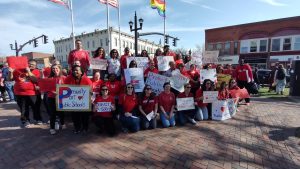Planning Commission Sides Against Green Acres
March 13, 2015
Opposition from Oberlin residents and members of the Oberlin Planning Commission has called the future of the Green Acres Project into question. The Green Acres Project is a proposed mixed-income housing development located on 15 acres of land that have been vacant for a decade between East Lorain Street and East College Street. Community Builders, a nonprofit development company, has designed a plan for the project; however, the plan has generated controversy, and the Oberlin Planning Commission voted not to approve the request for rezoning this past Wednesday.
The Green Acres Project is now on the City Council’s agenda for its April 6 meeting. The Council will vote then on whether or not to abide by the Planning Commission’s suggestion that it not rezone. If the Council votes against rezoning the land, the city administration will need to construct a new plan that will garner more support.
Even the most basic details of the project are still being debated. Green Acres is a mixed-income development, but Community Builders, as a nonprofit, will only construct multi-family units reserved for residents making 60 percent of the local median income or below. The portion of the development that Community Builders would work on is only five of the fifteen acres, so some market-price units could be included, as well as some affordable single-family homes. However, no developer has yet been chosen to build the market-price units.
Some residents of College Street are not eager to see a multi-family unit built in an area of predominantly single homes, but other Oberlin community members are excited about the prospect of new affordable housing.
“My personal concern is that the plan include low-income housing,” said Sharon Fairchild-Soucy, vice president of City Council. “We want to have some low-income, some market-price units and some individual affordable middle-class market value homes.”
Arlene Dunn, co-founder of the Oberlin Community Benefits Coalition, said that she agrees that affordable rental units are badly needed in Oberlin. She also stated that OCBC’s concerns are “to make sure that during the construction project as many local people and local businesses have opportunities to participate to the fullest extent possible.”
City Council member Bryan Burgess believes that in order for the project to go forward, serious changes need to be made to the current plan. As a resident of College Street who lives right next to the proposed development site, Burgess has recused himself from voting on issues relating to the project.
“I have yet to meet any of my neighbors that approve of the project as it exists right now,” he said. In Burgess’ opinion, the current plan, which calls for a three-story apartment unit to be built on the south quadrant of the property, needs to be reworked. Currently, the homes on College Street are primarily single-family, and Burgess said that he and his neighbors would like to see it remain that way. Burgess believes that a more suitable alternative would be for the apartment complex to be constructed on the north side of the property. He also said that public suggestions need to be incorporated more and that the current plan is not popular among citizens.
While environmental sustainability has been an important aspect of the design of the project, according to Peter Crowley, vice president of the Planning Commission, the current plan does not meet the goals it should.
“The current proposal to construct 50 rental units on the Green Acres site does not match the vision of sustainable development described in Oberlin’s Climate Action Plan,” wrote Crowley in a letter to the editor published on the Oberlin News Tribune’s website on Wednesday (“Polarizing Green Acres Plan is not Sustainable,” Oberlin News Tribune, March 10, 2015.) A special sustainability task force of city residents has formed to address exactly what sustainability measures the development should feature and what goals it needs to meet.
However, despite criticism, many are still enthusiastic about the current project and think only minor tweaks to the project are necessary.
“It is my personal hope is that we can work with Community Builders and find something that will be acceptable to the broader community,” Fairchild-Soucy said.


















